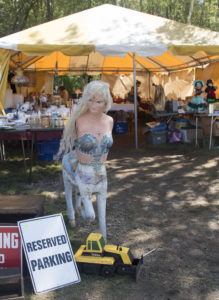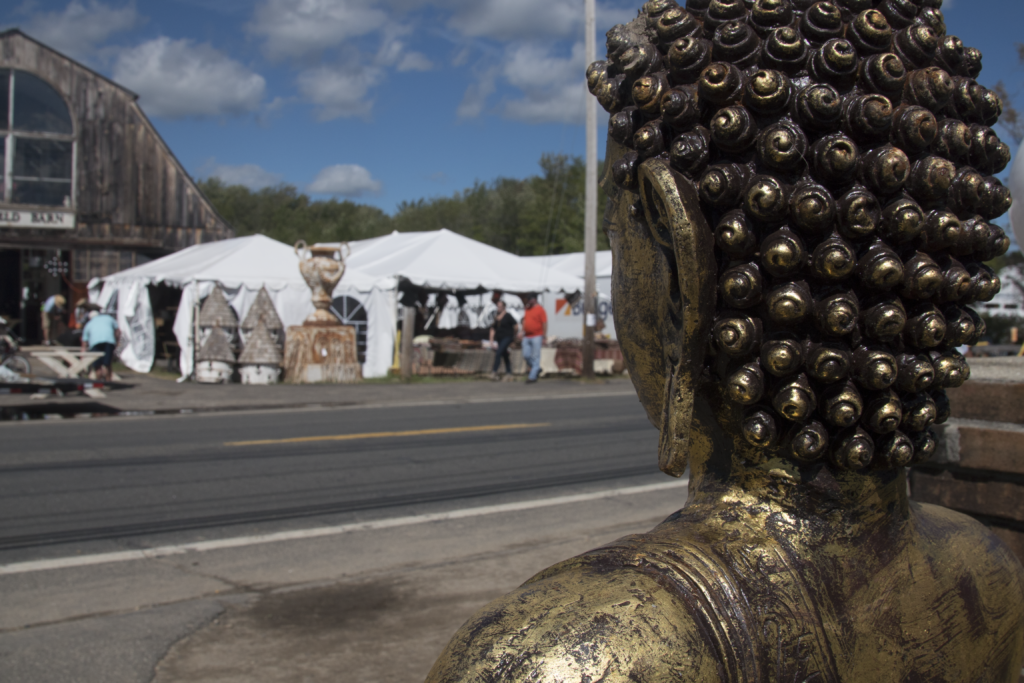Episode 49: One Man’s Trash

This week, we hear some stories and interviews from our archives. We find out what a Reveal/APM Reports investigation tells us about police de-escalation training in New England, and visit police in New Hampshire who are reaching out to children who’ve been traumatized by witnessing crime. We also explore the work of Marsden Hartley, whose art defined the rocky coast, the looming hills, and the working men of Maine. Plus we visit New England’s biggest flea market, where the people are as fascinating as the stuff on display.
De-Escalation
Many of the high-profile police shootings of the last few years across the U.S. have a disturbing common thread: they happen within a few minutes, or even a few seconds, after police arrive on the scene.
Several states require “de-escalation” training for their police officers. It’s meant to avoid situations where deadly force is viewed as the only resort.
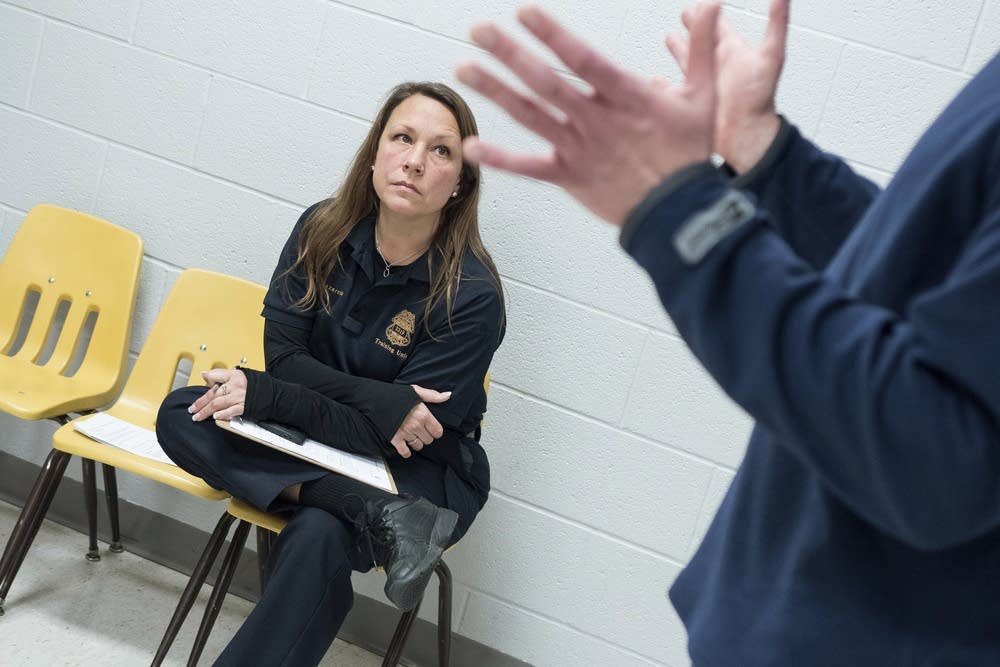
Officer Jennifer Lazarchic at a police training session in March 2016. Photo by Courtney Perry for MPR News
In New England, three of our six states have such mandates: Maine, Massachusetts, and Connecticut. Still, training requirements, and how well they are carried out, vary from state to state.
Below: An interactive map from APM Reports.
A recent episode of Reveal from the Center for Investigative Reporting worked with APM Reports to examine de-escalation state by state. Our guest is APM Reports correspondent Curtis Gilbert, author of the report “Not Trained to Not Kill.” We dig into the details and learn how New England states measure up.
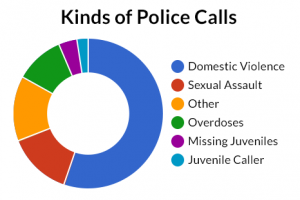
Types of police calls the Manchester ACERT team responded to July 2016 through March 2017. Graphic by Sara Plourde for NHPR
When police respond to a domestic violence call or a drug overdose, children are often on the scene when officers arrive. Manchester, New Hampshire police found that in 2015, 400 children had been on-scene during such calls.
Research shows that children exposed to trauma are more likely to be violent — and victims of violence — later in life. So Manchester police officers are trying something new: returning to the scene of such crises to see if they can help.
The first-of-its-kind program is called ACERT: Adverse Childhood Experiences Response Team. New Hampshire Public Radio’s Emily Corwin reports.
Marsden Hartley’s Maine
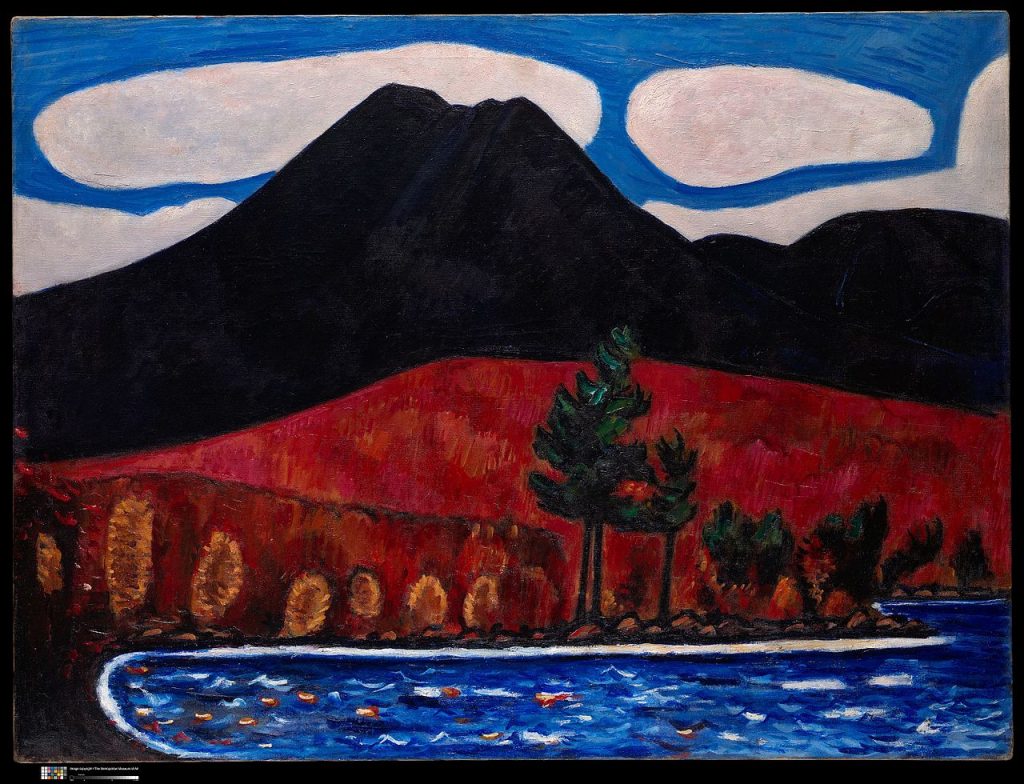
Mt. Katahdin in Maine, Autumn -2 by Marsden Hartley, 1939-40, Metropolitan Museum of Art

Portrait of Marsden Hartley by Carl Van Vechten, U.S. Library of Congress
In the permanent collection of the Wadsworth Atheneum, the nation’s oldest art museum in downtown Hartford, Connecticut, is a painting by Marsden Hartley called “Down East Young Blades,” depicting three colorful figures standing on a pier. Massive, strapping, working men with comically broad shoulders are pictured with the images of their trade: lobsters, fish, and logs.
Hartley’s career, stretching from the early years of the 20th century to his death in 1943, celebrated the vast and wild scenery of New England; specifically, his home state of Maine. The exhibition “Marsden Hartley’s Maine” will be featured at the Colby College Museum of Art in Waterville, Maine July 8 through November 12, 2017. (“Downeast Young Blades” is on loan from the Wadsworth for the exhibition).
Our guest Donna Cassidy, Professor of Art and American and New England Studies at the University of Southern Maine, co-authored the exhibition book about the artist’s relationship with the Pine Tree State.
Fiddlers and Peddlers
Of the 530 refugees who arrived in the New Haven metro area last year, more than 270 were children. Many have just finished their first year in school in the United States. WNPR’s Diane Orson reports on an arts program that’s partnered with the region’s resettlement agency to create a special after-school violin class for the young refugees.
In the 1954 film Brigadoon, the protagonists discover a magical village that only appears for one day every hundred years. Brimfield, Massachusetts is kind of like that. The town only has about 3,500 permanent residents. But for a week in each of May, July, and September, the town transforms into a bustling tent city known as the Brimfield Antique Flea Market.
The market dates back to the 1950s and today boasts over 250,000 visitors, stretching half a mile down Route 20. The next show will run July 11 to July 16.
At a market like this, the stuff comes with stories, and NEXT producer Andrea Muraskin found plenty on her visit last September. Be sure to check out the slideshow below.
About NEXT
NEXT is produced at WNPR.
Host: John Dankosky
Producer: Andrea Muraskin
Executive Producer: Catie Talarski
Digital Content Manager/Editor: Heather Brandon
Contributors to this episode: Emily Corwin, Alexandra Oshinskie, and Diane Orson
Music: Todd Merrell, Lightning on a Blue Sky by Twin Musicom, New England by Goodnight Blue Moon, “Family and Genus” by Shakey Graves, “The Mountain” by the Heartless Bastards, “A Hard Day’s Night” by the Beatles
We appreciate your feedback! Send praise, critique, suggestions, questions, story leads, and pictures of your own flea market finds to next@wnpr.org.


